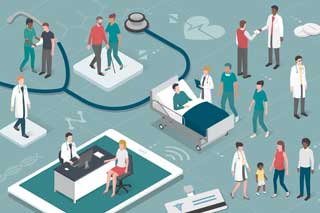The Word from Lansing: Vaccinations and the Common Good

Posted March 30, 2018
In February, the World Health Organization (WHO) reported that cases of measles increased four-fold in Europe during 2017, totaling over 21,000 incidents. Large-scale outbreaks affected approximately one in four European countries. Often characterized by fever and rashes, measles is highly infectious and can lead to complications such as ear infections, hearing loss, pneumonia, or swelling of the brain, especially in young children. The WHO report referenced contributing factors to this increase, which included declines in routine immunization coverage and low coverage among marginalized groups.
While the Centers for Disease Control and Prevention (CDC) considers measles to be eliminated in the United States—or no longer “constantly present” here—due to vaccines, unprotected travelers still unknowingly bring the illness back into the country. In recent years, an outbreak at a California amusement park demonstrated the continued impact of measles and other serious diseases on American communities, especially where many have not been vaccinated.
Vaccines have significantly curbed the rates of these diseases, building up the body’s natural defenses against the relevant viruses and bacteria. The CDC regularly recommends immunizations for sixteen illnesses, with others available based on a person’s risk factors or travel. As a result of this preventative health tool, smallpox has been eradicated worldwide, and diseases such as polio, rubella, and measles (as mentioned above) have been virtually eliminated in the United States. In addition to protecting individuals, vaccinations create community immunity. Research shows that if enough people in the community receive them, it becomes difficult for germs to travel from person to person, which can provide a layer of protection even for those that cannot get vaccinated due to severe allergies or weakened immune systems.
Within Michigan, children are required to receive vaccinations for ten highly contagious diseases before they attend daycare or school, and these requirements are checked before kindergarten and before seventh grade. State law does, however, allow parents to obtain a medical, religious, or philosophical waiver to exempt their child from this rule. Before these decisions are made, parents and health professionals benefit from open discussions about these preventative tools, the risks of serious diseases, and the possibility of any risk that may occur after an immunization.
Teachings from the Catholic Church—including the Pontifical Academy for Life, the Congregation of the Doctrine of the Faith, and the U.S. Conference of Catholic Bishops—provide insights for Catholics to also consider. These documents emphasize the benefits of vaccines for public health, especially for pregnant mothers and infants. They also address concerns about the use of certain vaccinations that were developed immorally, created using human cell lines from the fetal tissue of two induced abortions in the 1960s.
The Church encourages people of faith to use alternative, morally produced vaccines whenever possible. When that is not an option, Catholics may use vaccines made with human cell lines, to protect children and those most vulnerable in society, and they should reg¬ister a complaint with the manufacturer to encourage the development of moral options. The Pontifical Academy for Life also writes that Catholics may decline the use of immorally produced vaccines, “if it can be done without causing children, and indirectly the pop-ulation, to undergo significant risks to their health.” Such instances must be considered extremely carefully, with the wider health impact in mind.
In its March FOCUS publication, Vaccinations and the Common Good, Michigan Catholic Conference encourages individuals to learn more about vaccinations and their impact on individuals, families, and the greater community.
